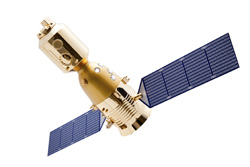Protecting satellites from space debris
The amount of debris floating around from about 80 kilometres (km) to 2,000 km above the Earth’s surface (low Earth orbit, LEO) is steadily increasing. Simultaneously, so is the number of satellites in this region. Particles less than 0.1 centimetre (cm) in diameter are already taken into account in satellite designs and those larger than 10 cm can be avoided. The debris in the mid-range remains a problem as it is not currently taken into account but has the potential to cause serious damage. A European consortium initiated the EU-funded ‘Reducing the vulnerability of space systems’ (REVUS) project to develop solutions to this growing problem, focusing on particles between 0.1 and 50 millimetres (mm). Project work began by evaluating the probability of damage from small debris and the specific satellite components most vulnerable. Vulnerability analysis has been completed using a debris environment model (MASTER 2009) and functional damage assessment tool (SHIELD 3). Scientists concluded that radar satellites are minimally vulnerable due to low altitude and geometry. Debris particles in the range of 2 to 6 mm pose the greatest threat. They have identified potential solutions including systems (active detection and mitigation), and modifications to satellite exterior (shielding) and interior (equipment configuration). Solutions are now being subjected to resilience analysis to generate design rules and recommendations potentially leading to standardisation. REVUS solutions to protect satellites in LEO from small debris are expected to have important impact on the aerospace and, particularly, satellite sectors. Applied, they could save industry a significant amount of money lost due to equipment damage and mission failure. By demonstrating long-term reliability and return on investment, REVUS could potentially also make it easier to receive funding for satellite projects in the future.



